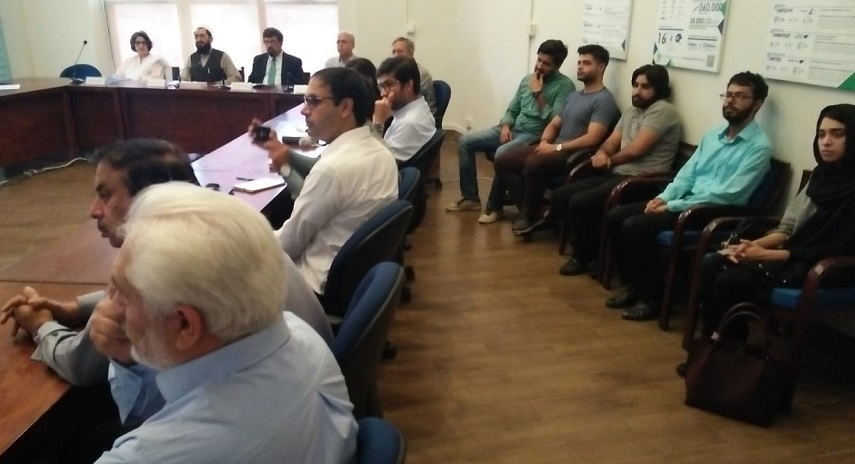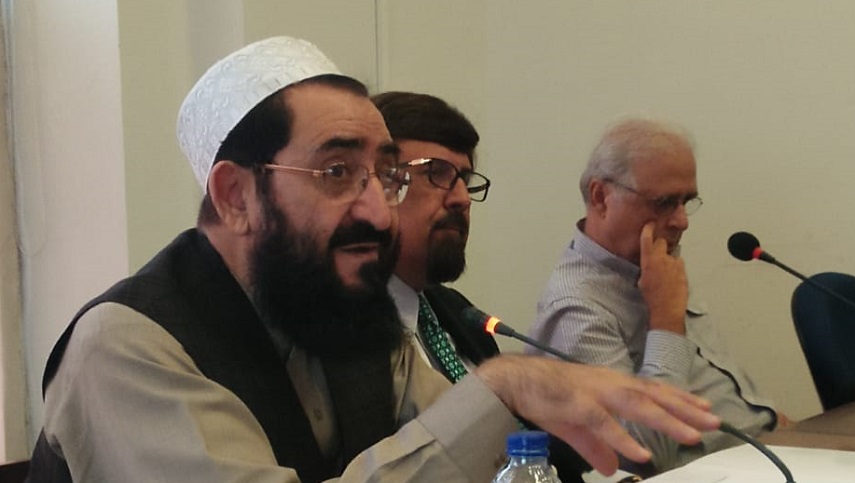Center for Research and Security Studies (CRSS), as part of the outreach program and university interaction, planned for Beyond Boundaries – the Track 1.5/II project, two distinguished members each from Pakistani and Afghan delegation visited National University of Science and Technology (NUST), Islamabad on Thursday, August 22, 2019. The interaction was focused on Pak-Afghan bilateral relations, specifically on the theme: “Pak-Afghan Detente, Afghan Peace Process and the Way Forward”. At NUST, the Pakistani group comprised Mian Sanaullah and Seema Ilahi Baloch, former ambassadors, while the Afghan side included Abdul Hakim Mujahid, head of executive council of the High Peace Council and Khalid Pashtoon, former Member of Afghan parliament. CRSS was represented by Saddam Hussein, Research Fellow. The faculty members and about 20-25 students attended the presentations by the two sides at the Center of International Peace and Stability (CIPS), NUST. Pak-Afghan delegates were hosted by Dr. Tughral Yamin, Associate Dean, CIPS.
After the recitation from the Noble Quran, the group was greeted and welcomed by Dr. Tughral Yamin. He thanked CRSS for arranging such important interactions for the students to discuss about Pak-Afghan relations and understand better the issues with a rational perspective and objectivity. He further enunciated that such a robust discussion would give the students numerous themes for research.
Khalid Pashtoon while giving his presentation highlighted that the singular aim of the Beyond Boundaries’ meetings is to connect people across the border and bridge the gaps between the two nations. The objective was to create a better environment in terms of social, political and economic ties. So far, the results of the initiative are remarkable as both sides have agreed on many things during the course of time and have come a long way. Youth gives us hope and it is our duty to reinforce that hope. Youngsters are leaders of tomorrow; ought to work together for peace and development, he added. Pashtoon thanked Pakistan for hosting Afghan refugees for nearly four decades. “Afghans will never forget the kind hospitality”, he said.
In Pashtoon’s view, Afghans have endured much pain and suffering; now is the harvest time. “In the context of Doha talks, peace seems to be around the corner. Almost everything is linked with security; once peace prevails, I hope Pak-Afghan relation will improve significantly”, he concluded.
Abdul Hakeem Mujahid started his presentation by expressing his deep love for Pakistan. “I lived in Pakistan for 30 years, married here; my children were born here. My kids have a deep connection with Pakistan. When they cross Torkham border into Pakistan, my children feel delighted and close to home.”
Mujahid further stated that both the countries have lot of common grounds to have some consensus and move forward. Afghanistan is the most attractive market for Pakistani goods and services. He shared with the students that Pakistani currency is used in many areas of Afghanistan. He suggested that both the countries should be patient with each other and remain as good neighbors; focus on confidence building measures. This is the only way forward, he added.
Speaking from Pakistani side, Ambassador Mian Sanaullah said that both the nations have to treat each other equally and live as two neighbors based on mutual interests. Commenting on India’s role in Afghanistan, Sanaullah opined Afghanistan should have the right to have relations with anyone it wants. Pakistan can just request Afghanistan and make sure within its own domain that Indian factor in Afghanistan does not affect Pakistan’s national security.
He also held the view that it is for the first time that all the regional countries and international powers are on the same page regarding the future of Afghanistan. This calls for grabbing the window of opportunity. Though, for sustainable peace, Pakistan supports Afghan led and Afghan owned peace process. The future of Afghanistan will be bright if somehow Taliban could be accommodated within state machinery either through elections or whatever formula all Afghans agree upon. This will guarantee long-term peace. It is nothing new and also tested in Tajikistan, known as Tajik formula – where militant opposition were eventually accommodated in power equation and peace prevailed, he told the students.
Seema Ilahil Baloch stated that the atmosphere is exceedingly conducive to harness peace in Afghanistan; if the opportunity is not seized, Kabul may have to wait for a very long time for another such prospect. Trump is looking at his upcoming election; this can act as a catalyst for Afghan peace process. China wants stability in the region to safeguard its economic interests. Pakistan also intends to grow economically now in connection with China Pakistan Economic Corridor (CPEC) and other mega projects. So, all are on same page and envision a peaceful Afghanistan. Never in history before, such a consensus was observed. However, she raised concerns over protection of women rights in post-deal Afghanistan.
In Q & A Session student asked different questions from the panel. These include the quires about what kind of power structure will emerge in Afghanistan if Doha talks conclude positively? Why Kabul ignores India’s suspicious activities in Afghanistan against Pakistan? Why Afghanistan blames Pakistan every now and then?
The panelist responded that the type of power formula will emerge in post-deal Afghanistan is unknown yet. The intentions of parties involved are unknown. The power equation would most probably be decided in intra-Afghan dialogue – the next phase of the peace process. There is a saying that the taste of pudding is in its eating. Panelists hope it tastes good.
Regarding India’s role in Afghanistan, Afghan delegates stated that New Delhi is assisting Kabul in reconstruction and social uplift of the people. Afghanistan is a poor country; it cannot refuse any aid or help from anyone. Though, they assured that Afghan soil is not used against Pakistan by anyone, at least they are sure that no such thing is allowed in state-governed areas. Commenting on blaming Islamabad every now and then by Kabul, Khalid Pashtoon said that it’s not blaming. These are complaints. We complaint often, because we like Pakistan. We have lot of expectations from Pakistan as one has from his brother. We don’t expect much from Iran, Russia etc. Pakistan is life-line for us and Afghanistan is door-way to Central Asia for Pakistan. Thus, both countries have no option but to cooperate, he said with the spark of optimism.
The session concluded with refreshments and a group photo.

